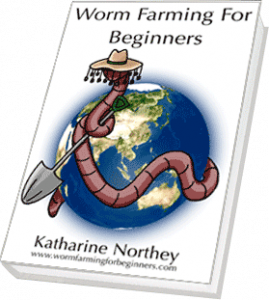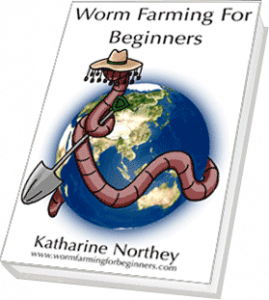Raising Worms.
When thinking of “raising Worms”, composting worms are one the easiest types. Red wigglers are one of the most accessible varieties to find as most hardware store now stock them. These are the type of worm that you can take home and start feeding your vegetable scraps too. The most common problems people have with raising worms is that they either: feed the worms too much or , keep the worm farm too wet.
Throughout my book “Worm Farming for Beginners” you will find the do’s and don’ts of beginner worm farming. Check out the contents page below:
Contents
5 – Nature’s Friend Poem
8 – Why Have a Worm Farm
13 – What is a Worm
16 – The Framework of a Worm
18 – How Worms Reproduce
20 – How Worms Breathe
20 – How Worms Move
21 – How Worms Eat
22 – Different Housing Structures
24 – Bedding Material
26 – Bathtub Worm Farm
30 – Garden Bed Worm Farm
34 – Styrofoam Box Worm Farm
38 – Garbage Can Worm Farm
43 – What to Feed the Worms
45 – How to Feed the Worms
46 – Herbs for the Worm Farm
48 – Castings, Vermicast and Worm Juice
49 – Harvesting the Worms, Vermi-Compost and Juice
50 – Using the Vermi-Compost and Juice
52 – General Info
54 – Whats Wrong with the Worm Farm (FAQ)
60 – The Land Beneath Our Feet Poem
62 – Wiggly Jokes
64 – Games
72 – Colour Me In
74 – Game Answers
79 – Notes and Observations
85 – Bibliography and Recommended Reading
86 – Glossary
90 – Index
By the end of reading this book you’ll never have to find a website like mine again!!
Happy Worm Farming!!
Raising earthworms.
Now when you ask yourself the question of “how do I start raising earthworms?” are you meaning the type of worm that you can feed your vegetable scraps to? Or, are you meaning the kind of worm you can put back into your garden beds? This is a very important question to consider as each type of worm does a different type of job. Now if your wanting to start raising earthworms to either : Go fishing with, or, to release them back to your garden beds then earthworms could be the choice for you.
Now if you’re planning on going fishing with the worms, take a moment and check out my article on “Bait worms” , it may just clear the subject up for you. But, if you’re planning on releasing the earthworms back into your garden, then please read on..
Earthworms like a completely different environment to composting worms. When preparing the beds for the earthworms try using a soil mixed with decomposing leaves. Refrain from using leaves that once belonged to Eucalyptus or chilli species as the essential oils present will be too strong. Also avoid leaves that once contained a milky sap as these are poisonous. If the soil is too “heavy” or “puggy” try adding some course washed river sand to the mix to aid in aeration and drainage.
In “Worm Farming for Beginners” there is a housing structure called the “Bathtub Method”. 
Simply follow the steps for this type of housing but use the bedding material I have just described instead of the mix indicated in the book.
The same principles apply with environmental conditions, pests, and feeding.
Earthworm farms/ earthworm farming.
There are lots of types of worms for lots of types of jobs. When your planning to use the worms for composting your vegetable scraps etc its probably best to choose “composting worms”. These specific breeds of worms are chosen for composting because of there ferocious appetites and there enjoyment for staying in the top layers of soil. Composting worms occupy a different ecological niche, living near the surface where there are high concentrations of organic matter, such as on pastures or in leaf mould, or under compost piles.
Now, if your talking about “earthworm farming” then that’s a different kettle of tea all together. Earthworm farming differs from composting worm farming in the following ways:
- Earthworms and composting worms like a different kind of diet.
- Due to the incapacity of the compost-raised worm to absorb sustenance from a soil wich is lacking humus (decayed animal matter), any transfer of it to an ordinary soil will prove lethal. Likewise, any endeavour to relocate an earth worm to a compost pile will result in fatalities.
- Anatomically, the compost worm, is almost one-third in size smaller than an earth worm. But being of the same family, its clitellum, head band, and segments are indistinguishable, except that they are more accentuated.
- In habits, earthworms burrows deeper into the soil in search of sustenance, whereas, the compost worm generally doesn’t burrow deeper the 8 – 12 inches. This is because the compost worm is a feeder on decaying organic matter, which is seldom found deeper than 12 inches it, so, it remains within that depth.
So , if your deciding to create a “composting worm farm” than maybe you should choose to purchase composting worms instead of earthworms. Red wigglers are generally sold in most hardware stores and are easy to raise and look after.
For more information on how easy it is to create a worm farm check out my new book “Worm Farming for Beginners”
It has everything you need to know about starting your own composting worm farm!
Happy Worm farming!


